#but the kyun suffix?
Text
Ok so... it seems that the new IF for Re:Zero this year is Mimagau part 2 and I have to say that reading the words:
"Emilio-kyun"
Gave me absolute damage.
#re:zero#rezero#re: zero#from what I understand the tan in Emilia-tan#was supposed to show his cringe level#but since tan suffix is not usually used in animes#it was initially cute and continued to be cute#but the kyun suffix?#no this was too strong for me
10 notes
·
View notes
Text
After the Attack Fes last weekend, Yuki Kaji posted this photo of him and Hiro Shimono on Twitter.

[楽屋にて、別角度から特別な人とも。だからどんな表情やねん。いつもありがとな、相棒っ!皆様からの愛にあふれたフラワースタンドほか、たくさんのお気持ち届いております!いつも、ありがとうございます🕊️]
= “In the dressing room with a special person from another angle.So what kinda expression is that?Thank you as always, partner!We have received many flower stands and other things brimming with love from everyone! As always, thank you so much🕊️”
While I translated aibo as ‘partner’ another option would be ‘buddy’ - the nuance of aibo as opposed to other terms referring to friendship is that it's a friend you work with (as they do), and someone you need to carry out your work.
[梶きゅんたら…もうっ🩷]
= “Kaji-kyun… 🩷”
Kyun is a cuter version of the suffix kun. The tara after a name has a nuance of emphasizing the person you named, making them stand out from other people. Mou usually gets translated as ‘already’ but can also be used to just highlight emotion, which judging by the heart emoji is to show him being very flattered.
[へへっ🥴]
= “Hehe🥴”
That's all, I just wanted to share this short Twitter exchange between them because they're always so fun.
Additional note: if you click on the alt text on the image on Twitter, he refers to Hiro Shimono as Shimono Hiro-chan.
Artists of tumblr, if thou can hear mine prayers, that image needs to be drawn as Shouto and Tonya doing those poses
#twt japanese is its own language I hate it but I wanted to share this cause I love their dynamic ncjdisi#this is why their scenes in bnha season 7 will be insane#translation#mine#Attack Fes#ait#bnha#Yuki Kaji#Hiro Shimono
11 notes
·
View notes
Text

グルミン
gurumin
・・・え?
...e?
元気のひけつ?
genki no hiketsu?
うーんと、ビタミンCかな?
uuunto, bitamin C kana?
キュン?
kyun?
ーーー
グルミン gurumin - bluebear’s japanese name. the word closest to グルミン gurumin in pronunciation is ぬいぐるみ nuigurumi, stuffed toy; stuffed animal; plush toy; soft toy; cuddly toy , which is probably what her name refers to
え e - eh?; what?; oh?
元気 genki - lively; full of spirit; energetic; vigorous; vital; spirited OR healthy; well; fit; in good health
の no - possessive particle. in xのy, x ‘possesses’ or ‘owns’ y or y is of the ‘essence’ of x
ひけつ hiketsu - secret (method, trick, etc.); key (e.g. to success); mysteries (of an art, trade, etc.); recipe; trick
うーんと uuunto - modified form of うんと unto, an adverb that means a great deal; very much; a lot OR with a great amount of effort. its an onomatopoeic word and a little cutesy
ビタミンC bitamin C - vitamin C
かな kana - か ka, a question marker, and な na, a sentence suffix that can be to seek confirmation or agreement from the listener and is a little more casual than ね ne. the two used in conjunction, かな kana conveys “i wonder?”
キュン kyun - bluebear’s japanese catchphrase. an onomatopoeia that conveys one getting choked up or their chest tightening in a bout of strong emotions or powerful feelings, usually in response to seeing/hearing something cute or endearing
ーーー
グルミン gurumin
・・・え huh?
元気のひけつ liveliness’ key?
うーんと loooots、ビタミンC vitamin C かな i wonder?
キュン kyun?
ーーー
Gurumin
...Huh?
The key to my liveliness?
Maybe its loooots of vitamin C?
Kyun?
i have bluebear refer to the ‘liveliness’ as her own because the previous dialogue was her cheering about how lively/good she was feeling
translating かな kana as “i wonder” all the time can get repetitive, even though that is the most reliable english phrasing i think we can have for it. the baseline is that the speaker is expressing that they are not definitely sure that what they are saying is correct and are leaving the statement open to contest
finding out about her jp name was funny because the wiki was also like. we are not 100% sure but we think this is it

3 notes
·
View notes
Text
Hatsukoi yo, Konnichiwa (“Hello, First Love”)
youtube
“A thrilling change of classes, so that our fates would cross...a thrilling change of classes, hello first love.”
OR: Girl gets placed in the same class as her crush.
anata no sugata wo mitsuketa toki
fui ni mune no oku ga KYUN to shita
atarashii kyoushitsu ni wakerareta
natsufuku wo kita seitotachi
When I spotted your figure
My heart suddenly skipped a beat
All us students were split into new classes
Wearing our summer clothing
「issho ni naretara to...」
sou hisoka ni
inotteita no yo
"If we can be together..."
I'd been secretly
Praying for that
tokimeki no (tokimeki no)
KURASUgae (KURASUgae)
unmei ga (unmei ga)
KUROSU suru you ni...
tokimeki no (tokimeki no)
KURASUgae (KURASUgae)
hatsukoi yo (hatsukoi yo) konnichiwa
A thrilling (thrilling)
Change of classes (change of classes)
So that our fates (our fates)
Would cross...
A thrilling (thrilling)
Change of classes (change of classes)
Hello, my first (my first) love
jouzu ni hanashi kakerarenakute
nando shisen dake ga atta deshou?
gikochinai egao no sono ato de
myouji de yonde kureta hito
Unable to easily talk to you,
How many times have only our gazes met?
You who give me an awkward smile then
Kindly call me by a last-name basis¹
rouka ya koutei de
mikakeru tabi
ki ni shiteita no yo
Each time I caught a glimpse of you
In the hallway or the schoolyard
You stole my attention
guuzen no (guuzen no)
SHAFFURU ni (SHAFFURU ni)
chikadzuita (chikadzuita)
awai kataomoi
guuzen no (guuzen no)
SHAFFURU ni (SHAFFURU ni)
hatsukoi yo (hatsukoi yo) konnichiwa
In this coincidental (coincidental)
Shuffle (shuffle)
This faint crush
Has drawn closer (closer)
In this coincidental (coincidental)
Shuffle (shuffle)
Hello, my first (my first) love
「hajimemashite, Watanabe Mayu desu」
「hajimemashite, Sato Sumire desu」
「hajimemashite, Oku Manami desu」
"Nice to meet you, I'm Watanabe Mayu."
"Nice to meet you, I'm Sato Sumire."
"Nice to meet you, I'm Oku Manami."
tokimeki no (tokimeki no)
KURASUgae (KURASUgae)
unmei ga (unmei ga)
KUROSU suru you ni...
tokimeki no (tokimeki no)
KURASUgae (KURASUgae)
hatsukoi yo (hatsukoi yo) konnichiwa
A thrilling (thrilling)
Change of classes (change of classes)
So that our fates (our fates)
Would cross..
A thrilling (thrilling)
Change of classes (change of classes)
Hello, my first (my first) love
kono saki ga (kono saki ga)
wakaranai (wakaranai)
tokubetsu na (tokubetsu na)
naka ni naremasu ka?
kono saki ga (kono saki ga)
wakaranai (wakaranai)
hatsukoi yo (hatsukoi yo) konnichiwa
I have no idea (no idea)
What'll happen from now on (from now on)
Will we form a special (special)
Relationship?
I have no idea (no idea)
What'll happen from now on (from now on)
Hello, my first (my first) love
LALALA...
LALALA...
---
¹ Last-name with a proper suffix (ie, Watanabe-san) is the polite way to refer to people you don’t know very well. “Kureru” attached to a verb implies it’s a favor/something appreciated, so I’m guessing the singer takes her crush calling her this way as the polite/gentleman-ish thing to do instead of something standoffish.
#Hatsukoi yo Konnichiwa#AKB48 Team B#stage: B5 'Theater no Megami'#lyrics#translation#Lyricist: Akimoto Yasushi#Composer: Hyadain#Arrangement: Kashiwara Nobuhiko#10s aidoru#aidoru songs referencing school#aidoru songs about crushing on a classmate#first stage performance: 05/21/2010
0 notes
Text
Kobayashi’s Maid Dragon Episode 6 Notes

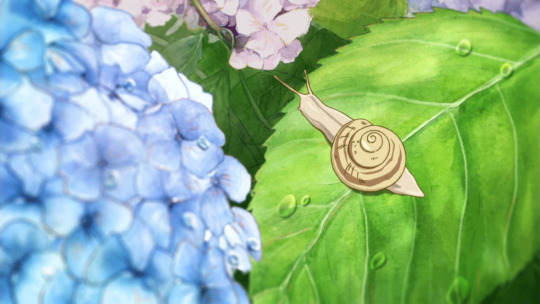
The first two cuts of the episode, and we're greeted with three different season words right off the bat. Kyoani is really making a lot of use of them in this show and I love it.
The first is the bird there, a swallow (tsubame 燕 in Japanese). Swallows are used as both spring and summer season words. In spring, they arrive back in Japan after their winter migration and start making nests and laying eggs.
In summer, the hatchlings have left the nest and are out finding their own mates.
The spring season word usage tends to allude to swallows' nests or chicks, and the summer spring word usage tends to refer to flying swallows.
Mmm, metaphors.
The second is the snail, which are especially associated with tsuyu 梅雨, the Japanese rainy season. The rainy season tends to mark the end of spring and beginning of summer—really you can think of it kind of like a fifth season, warmer than spring, cooler than summer, and rainy as heck. It usually lasts about a month and a half or so (and makes doing laundry hell).
The third is the hydrangea flower (ajisai 紫陽花 in Japanese), which like the snail is associated with tsuyu. If cherry blossoms are the spring flower, hydrangeas are the rainy season flower. Some people even go do flower viewings of them, though it's not as common a practice as it is with cherry blossoms.
They made an appearance in another fairly recent show, Amanchu:
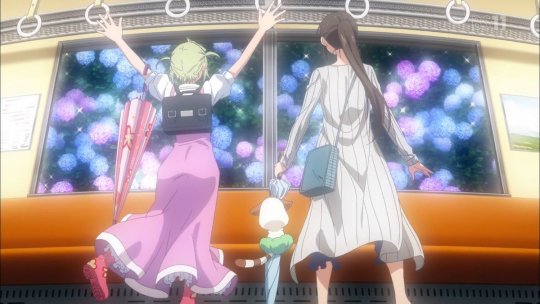

Notice the pink and blue slippers off to the right? Those are to wear when using the bathroom—or rather, the toilet, since the toilet will be in a separate room from the bath/shower in most Japanese homes.
So there's probably something like this on the other side of that door there:


Darjeeling, as I'm sure you know, is a fancy kind of tea. The name comes from where it is grown: the Darjeeling area in India. Much like Champagne, there are legal branding restrictions in place such that only tea grown and processed in parts of Darjeeling can call itself "Darjeeling."
"Flush" refers to when the tea leaves were harvested. First flush means those leaves were part of the first harvest of that year's crop. It's a good thing.
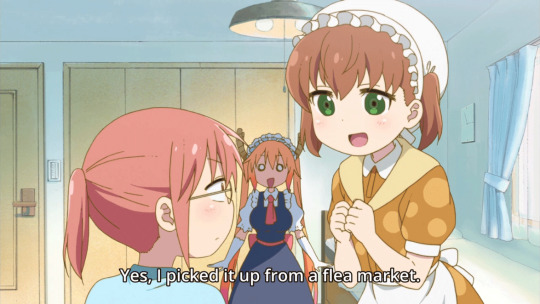
The Japanese word for flea market used here is a literal translation, nomi no ichi 蚤の市. Nowadays it's more common to refer to them with the English loan word (furii maaketto), as nomi is a gross bug and English is cool.
So, that it was a nomi no ichi and not a flea market possibly implies it was more of an old school affair aimed at an older audience... and/or a pun, because nomi (飲み) can also refer to drinking/beverages.
Random fact regarding the loan word version of the name: flea and free are both furii フリー in Japanese. Some "flea" markets in Japanese are actually called "free" markets, as anybody is "free" to join and sell stuff.
...Making "free market" one of those "Japanese English" (wasei eigo 和製英語) phrases that Japanese people will use sometimes when speaking English that leads to confusion, since of course free market means something quite different from flea market in native English.
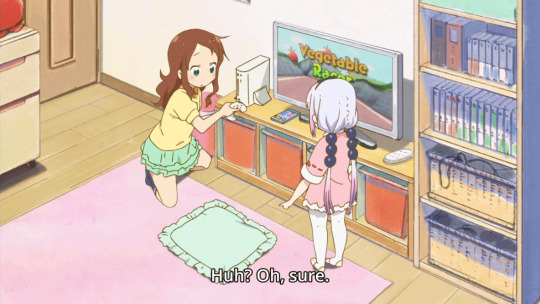
Vegetable Racer!
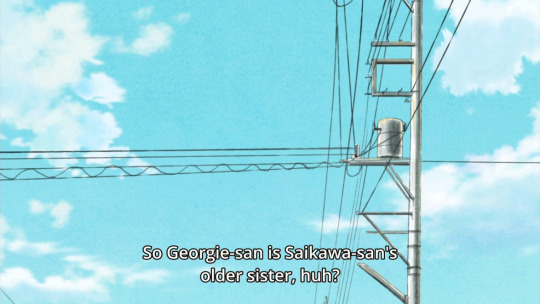
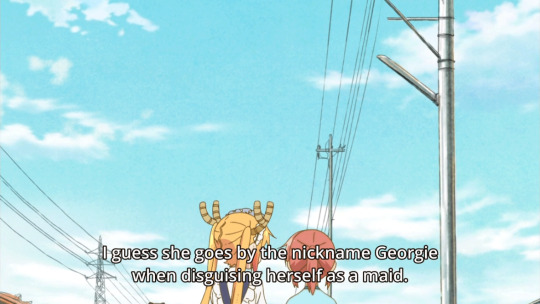
This is super minor, but I thought it was interesting (you might not; feel free to skip):
The way these are worded in the subs, to me, sounds like Kobayashi is either guessing at those facts (especially in the second one: "I guess [...]"), or just found out about them in the context of that conversation (especially in the first one: "So [...], huh?").
The Japanese nuance is slightly different:
ジョージさんって才川さんのお姉さんなんだって。Georgie-san tte Saikawa-san no onee-san nandatte.
ジョージはメイドに扮装してる時のニックネームだった。Georgie wa maid ni funsou shiteru toki no nickname datta.
The "nandatte" in the first line implies she was told that information by someone else (presumably Georgie) and is now explaining/telling it to Tohru and/or Kanna—more of a "turns out she was actually Saikawa-san's sister" sort of vibe.
The "datta" in the second line is a bit more of a solid statement than an "I guess"; following from the previous line it's a little more "...and the name 'Georgie' is what she uses when playing a maid."
So, again, suuper minor, but I thought that "seems to be inferring/guessing at those things" versus "heard them from (probably) Georgie and is telling them to Tohru/Kanna" distinction was interesting.

"Fanatic" here is "mania," a loan word often attached to things as a suffix in a similar way as otaku—in fact, a lot of people aren't really sure what the difference between the two is.
Basically, otaku is more "person who really likes X" and mania is more "person who is really devoted to X." You might think of it like "fan" versus "enthusiast."
Of course, otaku is also especially associated with anime/manga/games/etc., but both can be used for basically any hobby or interest.

Let's learn from this little frog and take a short break to enjoy the scenery a little.
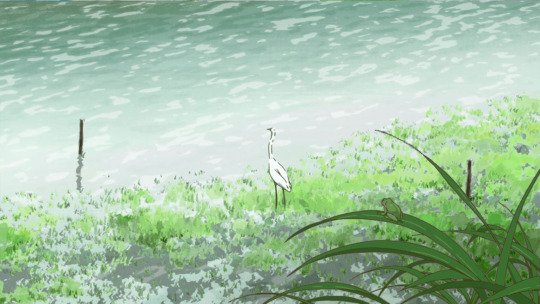



-

She seems to have been mouthing "nameaiko 舐め合いこ," i.e. the licking each other thing she used to do with Tohru, if you recall from episode three.

So nothing lewd at all, get your minds out of the gutter. This is a family show.

This seems to be a translation error. Lucoa is asking dou? kore kara asobi ni konai? どう?これから遊びに来ない?, which is not asking whether she can keep coming to visit them, but an invitation for them to come visit her new place. Specifically kore kara basically means "now"—which makes sense, considering they go to visit immediately after that conversation.

You've probably noticed these riverside shots in a bunch of other shows; they really are that common in Japan. The Japanese government has long loved standardized infrastructure projects, and this is one example (another being: notice how all the anime high schools look really similar?). They're basically artificial mini-flood plains to contain the rivers in the event of heavy rain (esp. in typhoon season) or whatever, while also providing some public space for kids to play or people to jog or whatnot. They're quite nice.
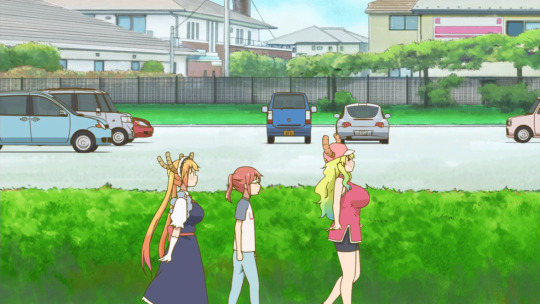
Interesting how Lucoa and Tohru both do that thing with their hands as they walk here.


Why Venusian? In mythology, Quetzalcoatl is said to have become Venus (rather, the morning star) after the whole incident with the sister.
For reference, "Venusian" in Japanese is the kanji for Venus (gold + planet/star) and person—i.e., the standard set-up for "person from X" (American [person] is アメリカ人, Japanese [person] is 日本人, etc.). But, if you wanted to get really literal about it, could also mean "Venus person," which would be pretty accurate according to the myth!

Shouta is a perfectly normal name for men. A similar name happens to be Shoutarou, the young boy protagonist in classic anime Tetsujin 28-go* (which you may be familiar under the name of Gigantor) .
Coincidentally, Shoutarou got a lot of...adult... fan material made about him, to the point people into that stuff were said to have a Shoutarou Complex, which was abbreviated to shotacon.
That has absolutely nothing to do with this new character here, as this is a wholesome family show.
*The tetsujin in that title follows the same kanji scheme as above, iron (鉄) plus person (人). The -gou is something attached to numbers in a numbering scheme; for example, Apollo 13 in Japanese is Apollo 13-gou (アポロ13号).
Also, the phrase used for "fidget" here is the same one from Konosuba episode 5: sowa sowa.

Interesting that his color scheme has a lot in common with Lucoa's (hair).
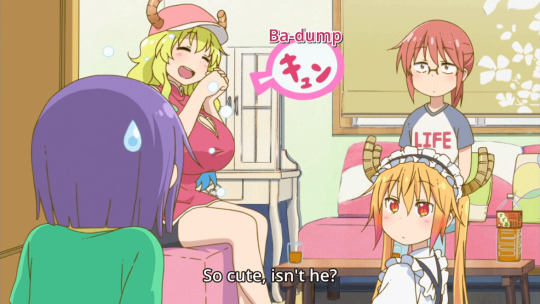
The text in the bubble is kyun キュン, the sound effect word for your heart "squeezing" when you see something excessively cute and/or lovable.
That can be both platonic, like a hamster or other small animal, or romantic, like the person you have a crush on, but in either case the key is how adorable it is.
It differs from doki doki, the other similar heart-pounding sound effect, in that kyun tends to be an instantaneous thing, and doki doki is more a continuous thing. For example, kyun is commonly a reaction to a cute action, like a hamster falling asleep in your hand, and doki doki is instead more like a state you're in, a raised heart rate while in close proximity with your crush.
Though exceptions exist of course.

Another super minor thing you can probably skip. The Japanese line here is:
僕が帰る流れになってない? Boku ga kaeru nagare ni natte nai?
Nagare is like "flow" (it's actually a noun-ified version of the verb "to flow," nagareru), both literally (like the flow of a river) and figuratively. It's often used in situations like this, where you can tell the "flow" of the conversation is headed in a certain direction/to a certain conclusion. Like "I see where this is going." Or perhaps more commonly(?), used in retrospect when describing why something happened; "I just went with the flow" or "it just kind of ended up that way" kind of stuff.
It's a common opinion in Japan that Japanese people are bad at saying no* to things (there's a bunch of pop literature written about this in Japanese, it's not just a "wow Japan is so weird" foreigner opinion), so this concept comes up a little more frequently than you might expect.
*Random example that always seems to bug the hell out of foreigners, especially when dealing with people like bank, government, etc. employees: the employee will typically say "mm, that would be a little difficult (chotto muzukashii or something)" instead of "no, we can't do that."
It usually involves a drawn out argument, where the foreigner is thinking "well fuck if they won't do it just because it's hard, that's dumb, it's their job," and the Japanese employee is thinking "why isn't this person taking the fucking hint, if I could do it I would."
That's a bit of an oversimplification, but is fairly illustrative of the concept in broad terms.



Mini Japanese lesson part, skip if you want.
The word here is youzumi 用済み, which is less "useless," and more "already used [and thus no longer needed]" (though the difference is minor in this case). Basically the idea is that all he cared about was the summoning itself, and doesn't need anything else from her now that it's done.
This you 用 is an interesting word that you'll see pop up a lot in Japanese. It's similar to one definition of "business"; i.e. if you have something to talk about with someone, you have business(you) with them, or if you have something you need to do, you have some business(you) to take care of.
In that sense, you can pretty much always translate it as "business" and that will be accurate enough in terms of meaning—however, it's usage is far more common, and it sounds "natural" in a lot more situations, so it's another of those words you'll see translated in all sorts of ways depending on context. E.g. なんか用?→What do you want?, 用を足してくる→I'ma go see a man about a horse, ちょっと用があるんで→Sorry, I'm kind of busy right now.
Not to be confused with you 用 as a suffix, which means "for _____," like kodomo-you 子供用 meaning "for children" (e.g. medicine).

The word for "bad" here is taihen 大変, which is yet another word that can be translated in many ways depending on context; generally speaking it's an adjective/adverb that serves as an amplifier (like very or extremely) that often-but-not-always has a negative connotation. Here, I would say it's a little closer in nuance to "I noticed something crazy."
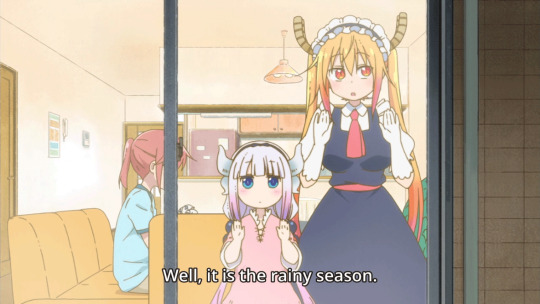

See, rainy season.
Anyway, a teruteru bouzu is a doll-like superstitious charm made and hung by the window to induce good weather. You'll often see it in slice of life anime on rainy day episodes, or sometimes in sports anime the day before a big match (in hopes the game doesn't get rained out).
Teruteru is a sound effect word for the sun shining (though it's not actually super common outside of "~ bouzu"), and teru 照る by itself is a verb for "to shine." Bouzu 坊主 is a word for a Buddhist monk, though through association it also refers to a bald/shaved head or a young boy (who traditionally often have shaved heads).
One theory on the origin comes from a Chinese myth about a girl who used a broom to brush away the rain clouds or something. Somewhere along the time it changed to a monk instead of a girl, and voilà? Iunno.
There are also some regional variations on the name as well, but you'll probably never hear any. I know I certainly haven't, at least not outside the context of wikipedia articles or a Japanese culture class I once took.
It's said you can hang them upside-down to make it rain instead—which makes them ame-ame bouzu.

Oh, Kanna is drawing something. Let's take a look.

Hmm, I wonder who that is?
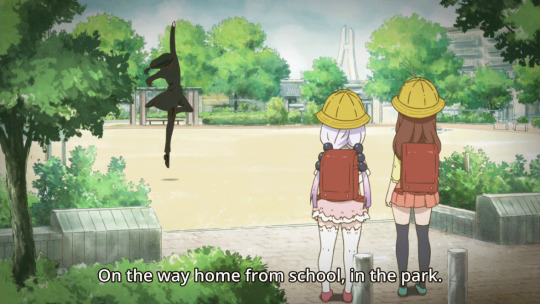
...Oh.

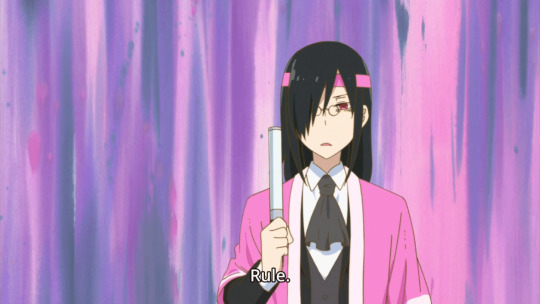


This sequence is a reference to idol concerts. That jacket is a happi, traditionally worn by workers (like say carpenters or the people who runs the stalls at festivals), but also a stereotypical otaku thing to wear to an idol concert. Same with the headband.
The stick is a colored light stick, another (even more) standard piece of equipment for live idol events.
You'd know all that if you watched Gintama.
The color choice (pink here) is often based on which member of the idol group is your oshi 推し, the one you've chosen to dedicate yourself to in particular—most groups will have an assigned image color for each member.
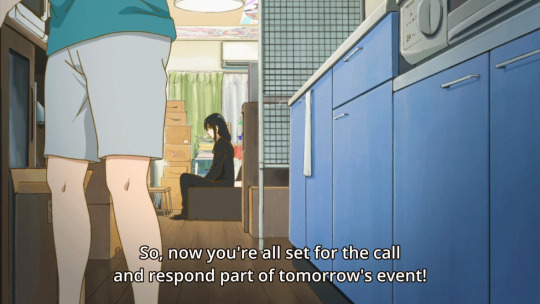
It's also a thing for there to be predetermined "calls and responses", where the idol(s) will say something and the audience will reply back with whatever.
The little "dance" (spin/jump/posing) is reference to wota-gei ヲタ芸, intensely and purposefully cringe-y dance things people will do at these events. Some people take them a little further.
Wota is short for wotaku, an alternate spelling of otaku (ヲタク vs オタク). The difference between the two is up for debate, but at the moment the w- version is more favored by actual otaku I guess?
Personally I'd say wotaku is more like anime/game/manga/etc. nerds (kind of like what "otaku" in the English community means) while otaku can, as mentioned earlier, refer to a wider variety of hobbies.
Gei 芸 means like performance, art, or trick.
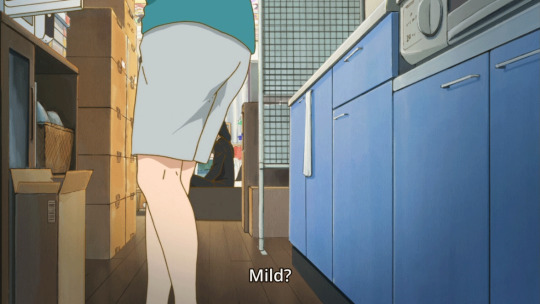
The word for "mild" is amakuchi 甘口, which in literal terms is more like "sweet." In practical terms "mild" is correct, but the fact that it has "sweet" (ama[i] 甘[い]) in the word gives it slightly more of a "lol that's for kids" nuance to it than "mild" has. I imagine the joke got across just fine anyway, but hey it's an excuse for me to write more words words words.

In case anyone missed it: lol even the rice was instant. These guys.
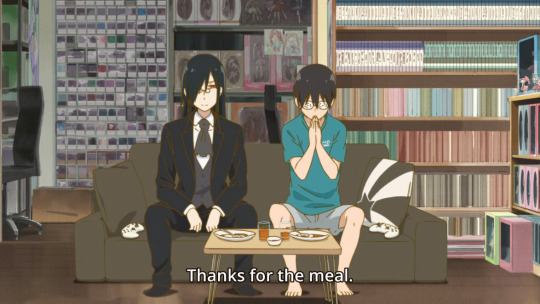
You are probably at least a little familiar with itadakimasu as the standard pre-meal "thanks for the food/amen" line, but there's also gochisou-sama deshita (the line here) that's the standard post-meal line. It basically means "it was a feast [that I was treated to]."
The word for "gaming addiction" here is netoge haijin ネトゲ廃人. Netoge is short for "internet game," basically MMOs (though technically any online game). Haijin is basically an invalid, someone too sick/injured/disabled to care for themselves—it's sometimes used to refer to people with severe drug addictions too.
Basically it's the equivalent of poopsocker.

The pronoun Takiya uses for "I" here is shousei 小生, a weird old one you typically don't see nowadays outside of some business emails—it goes well with his use of -dono instead of -san when in his weirdo nerd mode.


Who wouldn't be, it's got one section that's transparent! So convenient!

The word here is aiai-gasa 相合傘. Technically it just means "sharing an umbrella," and doesn't necessarily have any connection to "lover's." However....
Ai, with different kanji (愛), does mean love though. A combination of that pun and Japan's relative lack of public displays of affection ("a woman should walk three steps behind her husband" was a thing traditionally) led to the image of a couple sharing an umbrella being basically the gold standard for "couple" imagery.
You've probably seen this drawing before in another series at one point or another, with two names written underneath:

It's basically the equivalent of writing you and your crush's names (or initials) in a heart with an arrow through it—it's the thing you carve into a tree to be romantic or whatever.
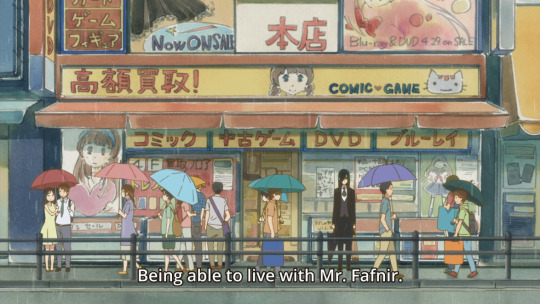
They're in Akihabara here, because of course they are.
Going by the manga, Kobayashi's workplace is in Kita-senju, which is like ten minutes from Akihabara by train.
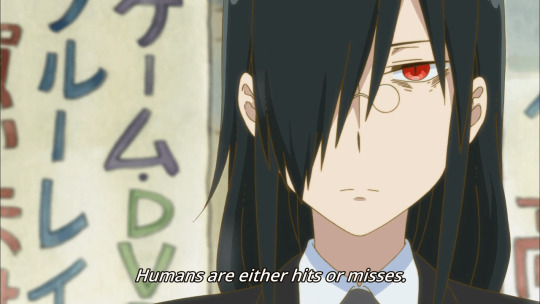
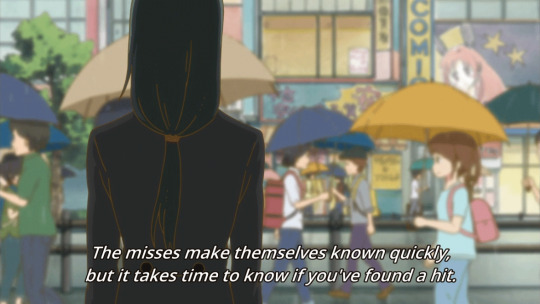
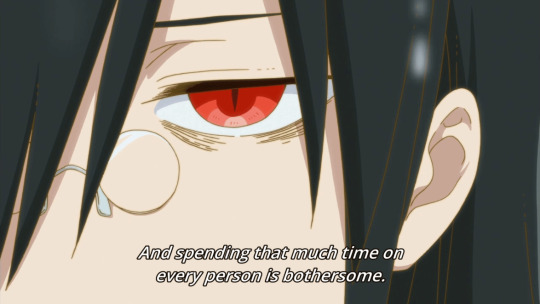


That's a lot of screenshots for two minor points, but here I go anyway.
First, the "on every person." Specifically he says ningen gotoki 人間如き. Ningen is human, and gotoki, when stuck onto the end of a noun like this, indicates basically condescension, in a "something of that [low] level" kind of way. For example it's often paired with "child," in a "they're just kids, don't let them get to you" or "I can't believe you lost to a kid" kind of way (from an adult's perspective).
Note that if you instead attach gotoki (or gotoku, same deal) using the no particle, it just means "like ____"—basically as a simile, no negative connotations.
For example, the series Hayate no Gotoku. Hayate means a strong gust of wind/gale, so the title basically means "like the wind." (Of course, the main character's name is also Hayate, so you've got that pun there too.)
Second: The last line there in the Japanese is "俺にとって人間は、住処に土足で踏み入り、宝を奪いに来るハズレでいい。Ore ni totte ningen wa, sumika ni dosoku de fumiiri, takara wo ubai ni kuru hazure de ii."
Basically the idea is not that it's better for humans to be trespassers who come to steal his treasure, but that, because it takes a lot of time to determine whether any one human is a "hit," and humans are beneath him anyway (see gotoki note), he's fine just saving the time and effort and assuming all of them are trespassing thieves.
The key point that distinguishes that from the sub line interpretation is the particle at the very end there is de instead of ga.
Basically, in these situations, de ii means "I'll settle for X" whereas ga ii means "X is actually what I want."
You'll hear those two lines paired together fairly often, actually. Especially with a character with self-esteem/confidence issues. Someone will ask them out, or ask them to join their team or something, and they'll reply by asking "Ore/boku/watashi de ii?" (You'll settle for me?/I'm good enough?). To which the other person will reply "Omae/kimi ga ii." (I'm not settling; you're exactly what I want.)
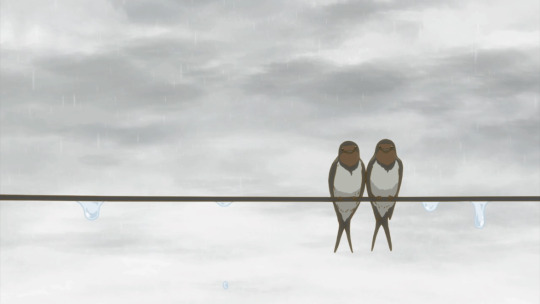
Oh there's those swallows again, the ones trying to find a mate.
By the way, swallows mate for life.

The word for fanservice here is teko-ire テコ入れ (for reference the usual word is "service/saabisu/サービス"). Teko means lever, as in the simple machine. Ire means to insert.
As a term, it originally refers to using leverage to overcome financial losses on the stock market. Your portfolio goes down, putting you in a bad spot, so you borrow money and buy more stock on leverage to try and make up for it.
From there, the term caught on in the rest of society with a broader usage: being in a bad situation and taking a gamble to try to fix it.
In TV (and thus anime), it refers to doing something new with a show (often some sort of gimmick, or changing directions) in an attempt to save it from bad ratings.
It's common in manga as well. Ever wondered why that slice of life romantic comedy series turned into a battle manga?
The "ratings" were bad, so they teko-iri’d it to try to save it before giving it the axe.
So if you assume this episode title isn't a joke (I'm pretty sure the ratings are doing fine, if not Kemono Friends level), it would be saying "honestly, our ratings suck, so we're switching gears and doing a fanservice episode to try to save them."
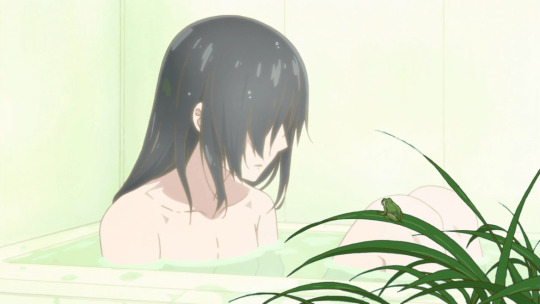
#kobayashi-san chi no maid dragon#miss kobayashi's dragon maid#maidragon#anime#translation notes#swallows mate for life
63 notes
·
View notes
Text
formal:
♂: fujimaru-kun/-san
♀: fujimaru-chan/-san
less formal:
♂: fuji-kun, ritsuka-kun/-san
♀: fuji-chan, ritsuka-chan/-san
significant other / close friend:
♂: ritsuka, ritsu-nii
♀: ritsuka, ritsu-nee
excessively playful:
♂: rii-kun/-san, tsu-kun
♀: rii-chan/-san, tsu-chan
derogatory:
♂: rii-kyun (just use the -kyun suffix)
♀: rii-pyon (just use the -pyon suffix)
0 notes